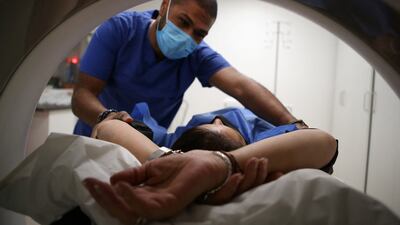A urine test has been developed that could detect the first signs of lung cancer, offering patients better chances of survival.
The new test searches for so-called "zombie" cell proteins found in the early stages of the disease.
Most lung cancer cases in England are diagnosed at later stages, when cancer can be harder to treat. Researchers hope the test will help patients start treatment sooner.
The test has been successfully trialled on mice, and scientists are hoping to start human trials soon.
Scientists at the University of Cambridge's department of chemical engineering and biotechnology, along with the Early Cancer Institute, looked at proteins excreted by senescent cells.
They are often called "zombie cells" because although they stop dividing, they do not die and can accumulate over time, causing tissue damage by reprogramming their immediate environment to help promote the emergence of cancer.
Scientists have found a way to detect their presence through an injectable sensor that interacts with zombie cell proteins, releasing a compound into urine that can be easily be picked up by a test.
"We know that before cancer emerges there are changes in the affected tissues," said researcher, Prof Ljiljana Fruk.
"One of the changes is the accumulation of damaged cells that are not damaged enough to be removed but enough to release signals that reprogramme the tissue and make it perfect for cancer development.
"We identified a specific protein released by these cells in lung tissue and designed a probe that is cut into two pieces in its presence. The probe is composed of two parts and the smaller one is released into urine through kidneys.
"Once in urine, this part of the probe is too small to be detected but it can be made visible by adding a bit of silver solution to it – the same silver compound used in photography in the early days of analogue photos."
Monitoring the colour of urine after the injection of the probe will suggest whether cells present in lungs indicate early signs of changes that might lead to cancer, she said.
"Ultimately, we wanted to develop a urine test that could help doctors identify signs of the early stages of cancer – potentially months or even years before noticeable symptoms appear," Prof Fruk said.
Scientists behind the study, which is being funded by Cancer Research UK, said they were keen to find a test that was a cheaper alternative to expensive scans.
"We urgently need cost-effective, easy-to-use and sensitive strategies for early detection of cancer, particularly within high-risk groups or those in danger of cancer recurrence," Prof Fruk said.
"Urine tests such as this could be performed in hospital labs even in the absence of expensive imaging instruments and rely on specific proteins, which can be linked to particular tissue. We worked on lung but there are other proteins that will be present in other tissues undergoing changes."

Experts are hoping to end the preclinical stages of trials soon and assess the effectiveness of the test in humans. Researchers have proven that urine detection works in mice, Prof Fruk said.
The next step is to identify specific proteins in other cancers, including breast, melanoma and pancreatic, and validate the results in patients.
"Of course, parallel to science we need to make sure that we have a kit in place, which can be easily used by hospital lab technicians all over the world," the professor said. "Lots of progress has been done in treatment of particular types of cancers but we need more and we need to do it faster."
Lung cancer is the third most common cancer in the UK, with about 50,000 people diagnosed each year.
Only 10 per cent of those survive for at least a decade after diagnosis. Figures show almost half, about 46 per cent of cases, are diagnosed when a person has later-stage lung cancer.

